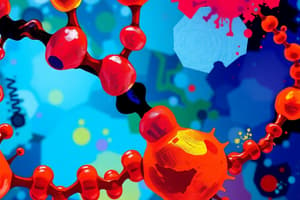Podcast
Questions and Answers
Who discovered cells in 1665?
Who discovered cells in 1665?
- Galileo Galilei
- Robert Hooke (correct)
- Antonie van Leeuwenhoek
- Robert Boyle
What is the basic unit of life?
What is the basic unit of life?
- Organism
- Cell (correct)
- Tissue
- Organ
What does the Cell Theory state?
What does the Cell Theory state?
- Cells come from non-living things
- Cells are the basic unit of structure only
- Cells come from pre-existing cells (correct)
- All living things are made of tissues
What is the difference between prokaryotes and eukaryotes?
What is the difference between prokaryotes and eukaryotes?
What is the function of the cell wall in plant cells?
What is the function of the cell wall in plant cells?
What is cellulose used for?
What is cellulose used for?
Can humans digest cellulose?
Can humans digest cellulose?
Flashcards are hidden until you start studying
Study Notes
- Cells were discovered in 1665 by Robert Hooke in cork slices.
- Cells are the basic units of life and make up all living things.
- The Cell Theory states that all living things are made of cells, the cell is the basic unit of structure and function, and cells only come from pre-existing cells.
- Organisms can be unicellular or multicellular.
- Prokaryotes are small and simple cells, while eukaryotes are large and complex cells found in animals and plants.
- Plant cells have a cell wall, cell membrane, cytoplasm, nucleus, ribosomes, endoplasmic reticulum, Golgi body, mitochondria, lysosome, vacuoles, and chloroplasts.
- The cell wall provides strength and support to the plant and is mainly made up of cellulose and lignin.
- Cellulose is used for making paper and can be converted into cellulosic ethanol, a biofuel.
- Some animals can digest cellulose with the help of bacteria in their stomachs, but humans cannot.
- Cellulose is important for dietary fiber and keeping waste moving through the digestive system.
Studying That Suits You
Use AI to generate personalized quizzes and flashcards to suit your learning preferences.




